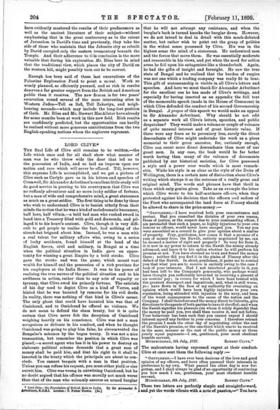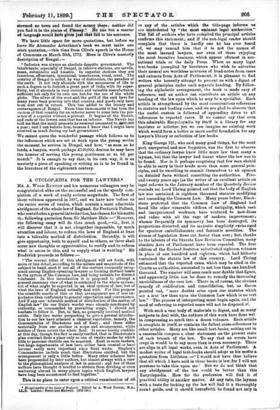LORD CLIVE.*
THE final Life of Clive still remains to be written,—the Life which once and for all shall show what manner of man was he who threw wide the door that led us to the possession of India, and so laid an impress upon our nation and race which will never be effaced. Till, however, this supreme Life is accomplished, and we get a picture of Clive such as Carlyle gave us in his letters and speeches of Cromwell, Sir Alexander Arbuthnot's excellent little study will do good service in proving to his countrymen that Clive was no ruffianly adventurer and no mere lucky soldier of fortune, but a man of wide and comprehensive mind, a great statesman as much as a great soldier. The first thing to be done by those who wish to understand Clive is to banish utterly from their minds the notion that he was a kind of melodramatic buccaneer, half hero, half villain,—a bold bad man who rushed sword in hand into a Treasury filled with gold and diamonds, and pil- laged it to his heart's content. Clive, though it is very diffi- cult to get people to realise the fact, had nothing of the slouch-bat brigand about him. Instead, he was a man with a real talent for military affairs who, owing to a series of lucky accidents, found himself at the head of the English forces, civil and military, in Bengal at a time when the political situation in India gave an oppor- tunity for winning a great Empire by a bold stroke. Clive gave the stroke and won the game, which meant vast wealth for himself and the possession of a rich province for his employers at the India House. It was to his power of realising the true nature of the political situation and to his swiftness in action, rather than to any acts of rapacity or tyranny, that Clive owed his princely fortune. The satirists of his day used to depict Clive as a kind of Verres, and hinted that he was haunted by remorse for his evil deeds. In reality, there was nothing of that kind in Clive's career. The only ghost that could have haunted him was that of Omichund, and to Omichund he offered no violence. We do not mean to defend the sham treaty, but it is quite certain that Clive never felt the deception of Omichund
weighing heavily on his conscience. Clive was not a man scrupulous or delicate in his conduct, and when he thought Omichund was going to play him false, he circumvented the Bengalee's schemes by the bogus treaty. It was not a nice transaction, but remember the position in which Clive was placed,—a secret agent who has it in his power to destroy an elaborate political scheme demands that a great sum of money shall be paid him, and that his right to it shall be inserted in the treaty which the principals are about to con- clude. You cannot bargain with a man in that position. Unless you can refuse his request, you must either yield or else outwit him. Clive was wrong in outwitting Omichund, but he no doubt argued that his offence was morally not much worse than that of the man who solemnly assures an armed burglar
• Lord Clive: the Foundation of British Ruls in India. By Sir Alexander J. Arbuthnot, K.O.B.L London ; T. Fisher Bassin. [SaJ that he will not attempt any resistance, and when the burglar's back is turned knocks the burglar down. However, we do not intend to deal in detail with this much-debated matter, but rather wish to point out the grasp of politics in the widest sense possessed by Clive. His was in the highest sense the mind of a statesman. He understood men and the forces that move them. He was essentially moderate and reasonable in his views, and yet when the need for action arose he fell upon his antagonists like a thunderbolt. Again, he had the gifts of insight and foresight. He saw the true state of Bengal and he realised that the burden of empire was not one which a trading company was really fit to bear. This gift of statesmanship is visible in all Clive's letters and speeches. And here we must thank Sir Alexander Arbuthnot for the excellent use he has made of Clive's writings, and especially for having inserted as an appendix the full text of the memorable speech (made in the House of Commons) in which Clive defended the conduct of his second Governorship in Bengal. A propos of this speech we would make an appeal to Sir Alexander Arbuthnot. Why should he not edit as a separate work all Clive's letters, speeches, and public despatches P They would make a volume or couple of volumes of quite unusual interest and of great historic value. If there were any fears as to pecuniary loss, surely the direct descendants of Clive might undertake the work as a pious memorial to their great ancestor, for, curiously enough, Clive can count more direct descendants than moat of our great men. In any case, the book would be far better worth having than many of the volumes of documents published by our historical societies, for Clive possessed a style and a power over words which is most remark- able. While his style is as clear as the style of the Duke of Wellington, there is a certain note of distinction about Clive's writing which stamps it as the outcome of a really great and original mind. The words and phrases have that thrill in them which only genius gives. Take as an example the letter which Clive wrote to his half-mutinous officers, when they protested against his decision that the officers and sailors of the Fleet who accompanied the land force at Plassey should be allowed to share in the prize-money :— "GIENTLEMEN,—I have received both your remonstrance and protest. Had you consulted the dictates of your own reason, those of justice, or the respect due to your commanding officer, I am persuaded that such a paper, so highly injurious to your own honour as officers, would never have escaped you. You say you were assembled as a council to give your opinion about a matter of property. Pray, gentlemen, how comes it that a promise of a sum of money from the Nawab, entirely negotiated by me, can be deemed a matter of right and property ? So very far from it, it is now in my power to return to the Nawab the money already advanced, and leave it to his option whether he will perform his promise or not. You have stormed no town and found the money there ; neither did you find it in the plains of Plassey after the defeat of the Noma. In short, gentlemen, it pains me to remind you that what you are to receive is entirely owing to the care I took of your interests. Had I not interfered greatly in it, you had been left to the Company's generosity, who perhaps would have thought you sufficiently rewarded in receiving a present of six months' pay ; in return for which I have been treated with the greatest disrespect and ingratitude, and, what is still worse, yo.i have flown in the face of my authority for overruling an opinion which would have been highly injurious to your own reputation, being attended with injustice to the navy, and been of the worst consequences to the cause of the nation and the Company. I shall therefore send the money direct to Calcutta, give directions to the agents of both parties to have it shroffed ; and when the Nawab signifies his pleasure (on whom it solely depends) that the money be paid you, you shall then receive it, and not before. Your behaviour has been such that you cannot expect I should interest myself any further in your concerns. I therefore retract the promise I made the other day of negotiating either the rest of the Nawib's promise, or the one-third which was to be received in the same manner as the rest of the public money at three yearly equal payments—I am, gentlemen, your most obedient humble servant, Muusuinanan, 5th July, 1757. ROBERT CLIVE."
The malcontents having expressed regret at their conduct, Clive at once sent them the following reply :—
" GENTLEMEN,—I have ever been desirous of the love and good opinion of my officers, and have often pursued their interests in preference to my own. What passed the other day is now for.. gotten, and I shall always be glad of an opportunity of convincing you how much I am, gentlemen, your most obedient humble servant, 31II103HID4LBLD, 9th July, 1757. ROBERT CLIVE."
These two letters are perfectly simple and straightforward, and yet the words vibrate with a note of passion,—" You have
stormed. no town and found the mono x there; neither did you find it in the plains of Plassey." No one but a muter of language would haft gIvin just that fall to his sentence.
We bare little space for more quotations, but before we leave Sir Alexander Arbuthnot's book we must make one more quotation,—this time from Clive's speech in the House of Commons on March 30th, 1772. Here is Clive's masterly description of Bengal :—
" Indostan was always an absolute despotic government. The inhabitants, especially of Bengal, in inferior stations, are servile, mean, submissive and humble. In superior stations they are luxurious, effeminate, tyrannical, treacherous, venal, cruel. The country of Bengal is called, by way of distinction, the paradise of the earth. It not only abounds with the necessaries of life to such a degree as to furnish a great part of India with its super- fluity, but it abounds in very curious and valuable manufactures, sufficient not only for its own use, but for the use of the whole globe. The silver of the west and the gold of the east have for many years been pouring into that country, and goods only have been sent out in return. This has added to the luxury and extravagance of Bengal. From time immemorial it has been the custom of that country for an inferior never to come into the pre- sEnce of a superior without a present. It begins at the Nawgb, and ends at the lowest man that has an inferior. The Nawab has told_ me that the small presents he received amounted to .41a00,000 a year ; and I can believe him, because I know that I might have received ae much during my last government."
We cannot quote the wonderful passage which follows as to the influences which are set at work upon the young writer the moment he arrives in Bengal, and how, " as soon as he lands, a banyan, worth perhaps £100,000, desires he may have the honour of serving this young gentleman at 4s. 6d. per month." It is enough to say that, in its own way, it is as masterly a piece of speaking or writing as is to be found in the literature of the eighteenth century.







































 Previous page
Previous page